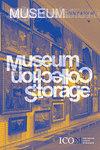Reframing the Present by Recontextualising The Past: Towards Decolonising Nigerian Museums
IF 0.4
4区 艺术学
0 ART
引用次数: 0
Abstract
Abstract Museums in Nigeria, as in other colonised countries across the globe, are often perceived as stemming from a Western social construct with origins in colonial administration. However, such a general notion fails to consider local ways of recording, presenting and preserving traditional artefacts: ones that specifically represent a people and its culture. During the colonial era, the establishment of museums was born out of the necessity to preserve immense collections that reflected the country’s diversity and to encourage the understanding and study of Nigeria from an interior, rather than exterior, colonialist, perspective. Another motivation behind establishing museums during the colonial period was to deter pillaging and theft and encourage the repatriation of objects that were illegally removed by ethnographers and researchers in the then-British colony (Murray 1967). Nevertheless, establishing museum institutions during the colonial era catered more to white settlers than to Indigenous audiences in Nigeria, since they showcased various cultures of the host community for the enjoyment of foreigners. As a result, various communities became hesitant to release their sacred objects to western collectors and institutions; they resisted colonial collection practices because they negated local identities, sacredness and value systems. Artefacts became effectively ‘encased’ in museums and storage spaces, alienating them from their original identities and owners, even while held in their country of origin. This paper investigates how recontextualising the past can aid in decolonising museum spaces, specifically highlighting how the inclusion of local languages in museum exhibitions and materials can serve as one such tool. Using a case-study approach, the paper investigates how the incorporation of local languages in two public museums in Lagos, Nigeria play an important role in efforts to decolonise these institutions — and might be applied to museums elsewhere.通过重新文本化过去来重塑现在:走向尼日利亚博物馆的非殖民化
与全球其他殖民国家一样,尼日利亚的博物馆通常被认为源于殖民统治时期的西方社会结构。然而,这样一个笼统的概念没有考虑到当地记录、呈现和保存传统文物的方式:那些专门代表一个民族及其文化的文物。在殖民时期,博物馆的建立是出于保存反映该国多样性的大量收藏品的必要性,并鼓励从内部而不是外部殖民主义的角度来理解和研究尼日利亚。在殖民时期建立博物馆的另一个动机是阻止掠夺和盗窃,并鼓励归还当时英国殖民地的民族志学家和研究人员非法拿走的物品(Murray 1967)。然而,在殖民时期建立博物馆机构更多地是为了迎合白人定居者而不是尼日利亚的土著观众,因为它们展示了东道国社区的各种文化,供外国人欣赏。因此,各个社区开始犹豫是否要将他们的圣物交给西方收藏家和机构;他们抵制殖民主义的收税做法,因为这种做法否定了地方身份、神圣性和价值体系。文物被有效地“包裹”在博物馆和存储空间中,远离了它们最初的身份和主人,即使它们被保存在原产国。本文探讨了如何将过去重新语境化可以帮助博物馆空间去殖民化,特别强调了如何将当地语言纳入博物馆展览和材料中作为一种工具。这篇论文采用案例研究的方法,调查了尼日利亚拉各斯的两个公共博物馆如何将当地语言纳入这些机构的非殖民化努力中发挥重要作用——并且可能被应用到其他地方的博物馆。
本文章由计算机程序翻译,如有差异,请以英文原文为准。
求助全文
约1分钟内获得全文
求助全文
来源期刊

MUSEUM INTERNATIONAL
ART-
CiteScore
0.60
自引率
0.00%
发文量
0
期刊介绍:
In its new revised form Museum International is a forum for intellectually rigorous discussion of the ethics and practices of museums and heritage organizations. The journal aims to foster dialogue between research in the social sciences and political decision-making in a changing cultural environment. International in scope and cross-disciplinary in approach Museum International brings social-scientific information and methodology to debates around museums and heritage, and offers recommendations on national and international cultural policies.
 求助内容:
求助内容: 应助结果提醒方式:
应助结果提醒方式:


